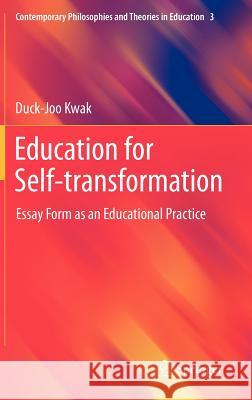Education for Self-Transformation: Essay Form as an Educational Practice » książka
Education for Self-Transformation: Essay Form as an Educational Practice
ISBN-13: 9789400724006 / Angielski / Twarda / 2011 / 150 str.
Education for Self-Transformation: Essay Form as an Educational Practice
ISBN-13: 9789400724006 / Angielski / Twarda / 2011 / 150 str.
(netto: 383,36 VAT: 5%)
Najniższa cena z 30 dni: 385,52
ok. 16-18 dni roboczych.
Darmowa dostawa!
Exemplifying what it advocates, this book is an innovative attempt to retrieve the essay form from its degenerate condition in academic writing. Its purpose is to create pedagogical space in which the inner struggle of 'lived experience' can articulate itself in the first person. Working through essays, the modern, 'post-secular' self can guide, understand, and express its own transformation. This is not merely a book about writing methods: it has a sharp existential edge. Beginning by defining key terms such as 'self-transformation', Kwak sketches the contemporary debates between Jurgen Habermas and Charles Taylor on the status of religious language in the public domain, and its relationship to secular language. This allows her to contextualize her book's central questions: how can philosophical practice reduce the experiential rift between knowledge and wisdom? How can the essay form be developed so that it facilitates, as praxis, pedagogical self-transformation? Kwak develops her answers by working through ideas of George Lukacs and Stanley Cavell, of Hans Blumenberg and Soren Kiekegaard, whose work is much less familiar in this context than it deserves to be. Kwak's work provides templates for new forms of educational writing, new approaches to teaching educators, and new ways of writing methodology for educational researchers. Yet the importance of her ideas extends far beyond teaching academies to classroom teachers, curriculum developers - and to anyone engaged in the quest to lead a reflective life of one's own.Kwak's work provides templates for new forms of educational writing, new approaches to teaching educators, and new ways of writing methodology for educational researchers. Yet the importance of her ideas extends far beyond teaching academies to classroom teachers, curriculum developers - and to anyone engaged in the quest to lead a reflective life of one's own. Kwak's work provides templates for new forms of educational writing, new approaches to teaching educators, and new ways of writing methodology for educational researchers. Yet the importance of her ideas extends far beyond teaching academies to classroom teachers, curriculum developers - and to anyone engaged in the quest to lead a reflective life of one's own.
This book is a fresh and unswerving attempt to retrieve the essay form from its degenerate condition in academic writing, and the author exemplifies what she advocates, in contradistinction to so much writing in educational research. Her purpose is to preserve the possibility of a pedagogical moment in which the first-person voice of the inner struggle of lived experience can be articulated and expressed. This, then, is not merely a book about writing methods: it has a sharp existential edge. §Directly addressing the status of the modern self in its (post-)secular condition, Kwak searches for a philosophical practice able to reduce the experiential rift between knowledge and wisdom. Beginning by defining key terms, including self-transformation itself, she sketches the contemporary debates between Jürgen Habermas and Charles Taylor on the status of religious language in the public domain, and its relationship to secular language. This allows her to contextualize the book s central questions: what is to be the nature of philosophical practice in a post-secular age? How can the philosophical practice of the essay form be developed so that it facilitates, as praxis, pedagogical self-transformation? Kwak then moves on to develop answers to these questions through dialectical responses to the ideas of George Lukács and Stanley Cavell, of Hans Blumenberg and Søren Kiekegaard philosophers centrally relevant to her interrogation, but whose work is much less familiar in this context than it deserves to be. What is at stake here is no less than the expression of self-formation and transformation. The author develops templates for new forms of educational writing, novel approaches to teaching educators, and as-yet unexplored avenues of writing methodology for educational researchers. The relevance of her ideas will thus resonate far beyond teaching academies and be a boon to classroom teachers and curriculum developers too.§What is at stake here is no less than the expression of self-formation and transformation. The author develops templates for new forms of educational writing, novel approaches to teaching educators, and as-yet unexplored avenues of writing methodology for educational researchers. The relevance of her ideas will thus resonate far beyond teaching academies and be a boon to classroom teachers and curriculum developers too.











